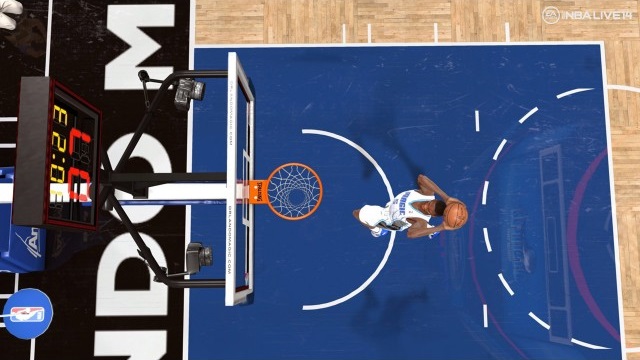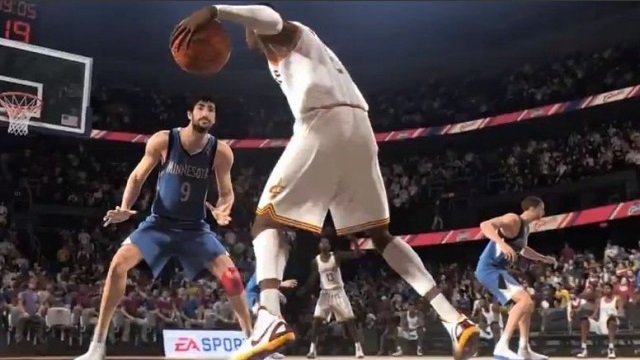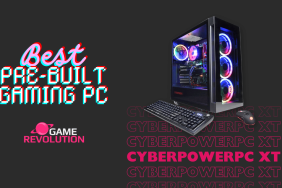Who got next?
Growing up, I remember there were two sports titles my buddies and I couldn’t wait to be released in the last half of the year: Madden Football and NBA Live. Religiously, year after year, we would walk fifty miles, in the snow, holes in our shoes, no coats, no food rations, and very little water. All right, realistically, our parents would drive us to the local EB Games (who remembers EB Games?) for us to pick up a copy. But regardless of the journey, we knew for the next few months, these would be the games to play.
Over time, as always it would seem, EA Sports would run into competition for each respective title they would release. Madden had a few companies looking over its shoulder, Midway challenged the basketball brand tough, and 2K has always made a run for sports entertainment glory. But some way EA came out, at least commercially, as the best. From licensing to marketing, everyone seemed to have an idea of which brand would be best that year.
This is no longer the case; sure, there are plenty of upsides to what EA creates but the envelope has been pushed more than ever to come up with better, and NBA Live hasn't been around for almost half a decade. After a four-year hiatus and a failed prequel (NBA Elite), NBA Live has returned with its 2014 edition. And the verdict, sad to say, is to hold off. It's tough because I love(d) the Live brand; hell in college, this game alone helped me take a young would-be challenger’s money to buy those late night Jack in the Box cravings. Not saying I condone personal gamblings (kids, stay in school), but it’s safe to say this return has fallen from grace.
With the next generation upon us, it’s exciting to see the latest in console technology and what more there is to come. But if this is what’s to offer from a once illustrious brand, I’ll take the check and be on my way. One of the main upgrades Live boasted about was their new “bounceTek” dribbling system: “Players are now separate from the ball." In many regards, this new physics-based system does work. The ball will bounce accordingly to how a player controls it and has a fairly smooth rhythm. It's a plus for production value, but this quickly becomes overshadowed by the awkward movement of the players.
With so much time spent on enhancing the ball physics, what happened to separating the player from the court? When leaving the ground for a rebound, jump shot, or block, players don't move fluidly. Especially with the jump shot, there are kinks to the motion and players make too many movements to set-up for a jumper. Along with shots in the air, opponents seem to have an unfair advantage at blocking shots. With slow mechanical shots, it’s too easy to time a block and doing so has far too high of a success rate. Motion already feels sluggish, and to add insult to injury, there’s a major button delay. Telling my players what to do sometimes does not compute for a full second later.

This isn't just in the air either, as players move a bit stiff in general. Ball handling itself isn’t all that bad thanks to the emphasis of bounceTek. Crossovers and behind the back dribbles can be carried out with much effort but interactions between players are lacking. When calling for a screen or setting one up, defenders are almost completely unphased. Sure, pro players can beat screens with communication and help from teammates, but this isn’t a case of smart strategic defending. A defender may not even know the screen or offensive player is there, adding to the many inconsistencies with physical exchanges on the court.
Graphics aren’t bad, not as fantastic as one would imagine but with plenty to build upon and they match the surrounding presentation. Fans in the stands, though, could use better 3D modeling. Pre-, mid-, and post-game activity gives the same spectacle you would see if watching a broadcast on ESPN, which Live has exclusive naming rights to; hence, when watching the long halftime report Jalen Rose gives, it will be just like what you see on ESPN. The coolest part is in-huddle listen-ins of coaches readying their teams for the second half. It's neat hearing Mark Jackson talking about relevant keys to the game as I prepare to make a comeback with the Warriors. But play-by-play commentary itself is awful and completely redundant, repeating just about every quarter. (Yes, Live, I know I need to better and that this isn’t the YMCA!)
A few major game features are around to help switch gears from just the basic 5-on-5 exhibition mode, with Ultimate Team being the most familiar option. Fans to the EA sports brand will quickly recognize this mode, as it has been implemented in its FIFA and NHL franchises. It works in a similar manner where you earn in-game coins to unlock player cards for bettering your team, and overall, it's a fun mode if you’re into more of a fantasy-type league.
Two of the better features include NBA Rewind and BIG Moments. Moments is all about simulating meaningful basketball as an individual or as as a team. There are a number of challenges available to be played: Choosing a guy like Rajon Rondo, you might have to record 5 assists in the final 2 minutes to lead Boston to victory; or as a team option, you might choose Golden State and need to knock down 7 threes in one quarter. It’s supposed to bring the awe moments to your hands.

NBA Rewind is geared around true-to-life, on-court moments, some as recent as the night before. Recreating a dramatic game is the focus, and the players will be placed in the same conditions they were the day of the game. So if LeBron James goes off for 40 points, 12 rebounds, and 8 assists against New York, your task will be either to match his numbers or better them. On the flip side, you might choose New York and need to hold James under those totals to complete the challenge. However you choose, it’s all in hopes of revisiting that same level of competition.
Also, the Rising Star selection is a point of emphasis for Live, which is actually a bit misleading. When talking about rising stars in the NBA, the thought of All-Star Weekend comes to mind. And that brings hopes of skills challenge, three-point shoot-out, and dunk contests, none of which are present. In many ways, Rising Star does still apply to some All-Star Weekend festivities, in the form of referring to the sophomores and rookies of the league, with the attention being on the latter. Just like 2K’s form of MyCareer, Rising Star follows the path of your created player, from the Draft Showcase game, to the draft, and through your player’s career, as you attempt to become one of the best to ever play the game. Just like MyCareer, you’re graded in-game on everything you do well as well as bad. The better you do, the more likely you’ll gain points to be used for upgrading your player’s skills.
In its return, NBA Live 14 helps kick off what there is to come for next-gen gaming, but as a representation for sports brands, it’s not the best outing. Live has authentic sights and sounds, game mode options, and specific licensing, but the underlying structure is lacking. Sure, elements like ball movement are nice, but then player movement is forgotten. Having Jeff Van Gundy give real quips about a game is refreshing, though it gets old quickly when he repeats them two, sometimes three times, a game. Luckily, there is major competition out there to make sure NBA Live adapts to its surroundings, and I hope it can regain its crown as the go-to game of its genre.
-
"bounceTek" dribbling system
-
NBA Rewind
-
Limited variety in commentary
-
Players are stiff
-
ESPN licensing
-
Slow movement coupled with button delays







